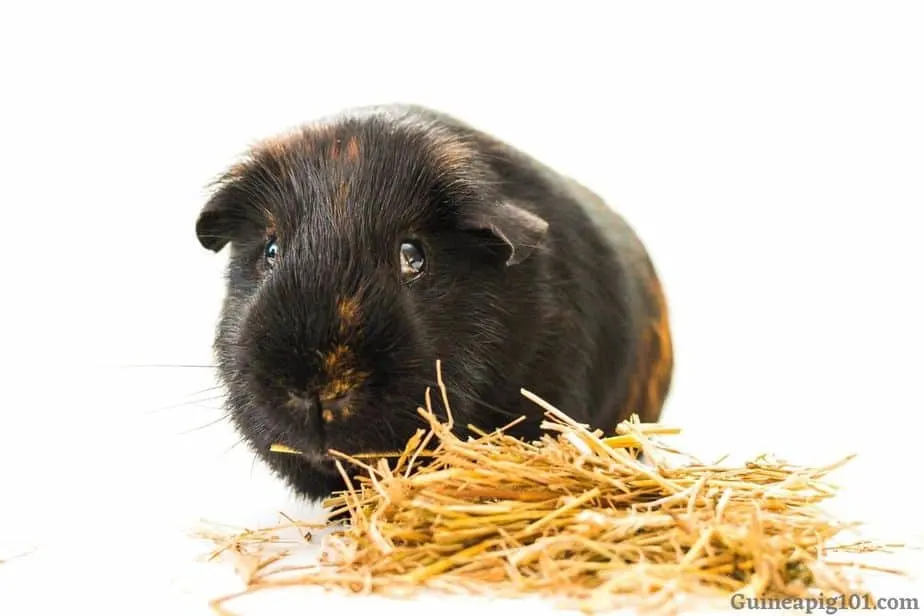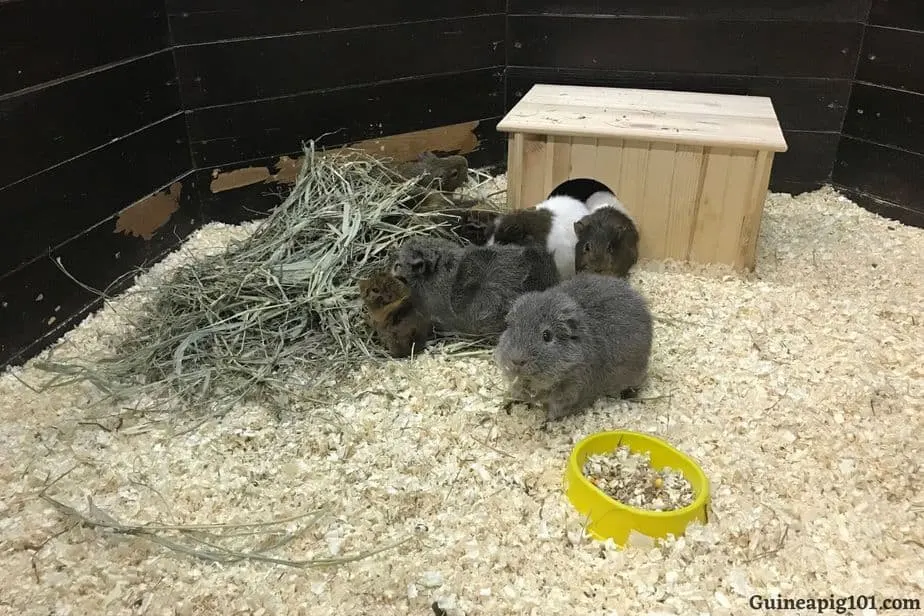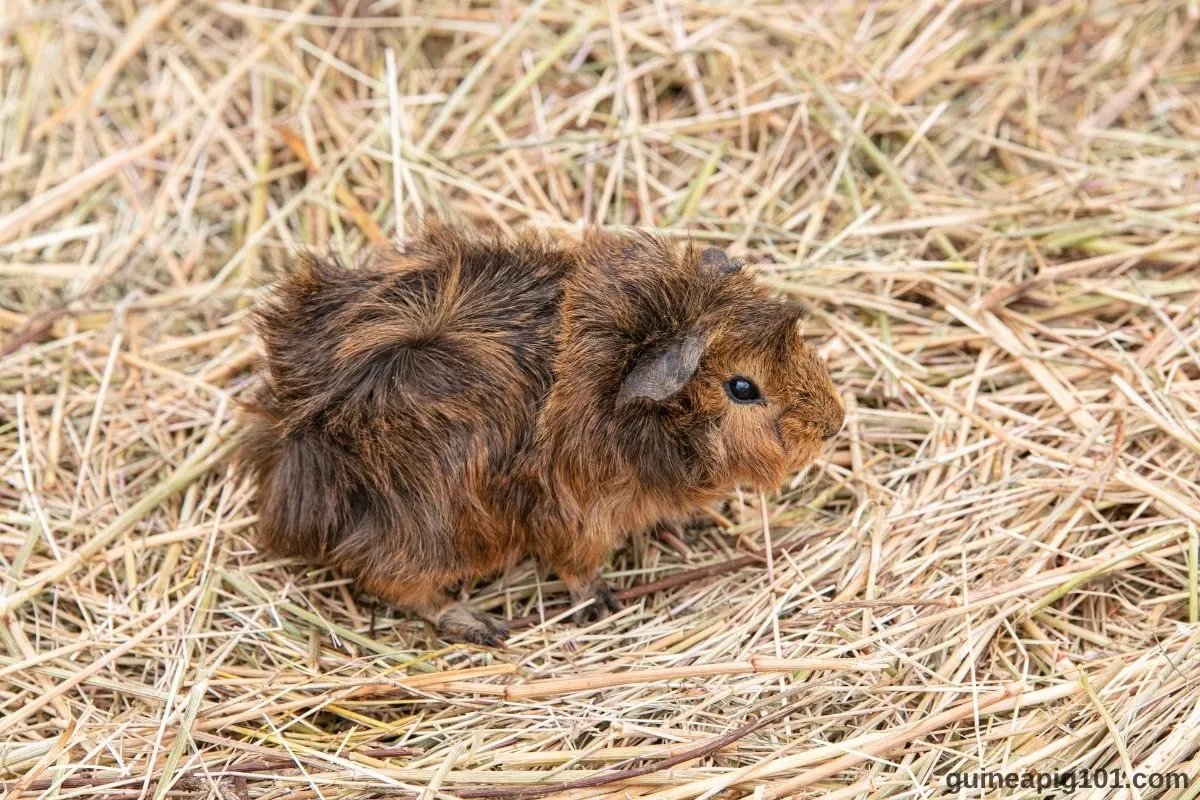Straw is an agricultural byproduct consisting of dry stalks of wheat, rice, oats, or barley. Being readily available at an economical price, people often wonder if they can use straw as bedding material in their guinea pig’s cage. So, I decided to do some research and here is what I have learned.
Straw doesn’t absorb the urine well, and as a result, it doesn’t reduce odor nor keeps the guinea pig’s feet dry. Hard and pointy stalks of straw can poke into your guinea pig’s eye resulting in eye injury. Thus, it would be best if you did not use straw in a guinea pig’s cage.
I know it can be challenging to choose the correct bedding for your guinea pigs. But bear in mind, if you choose it wrong, your guinea pig may suffer from health problems, and that is something all guinea pig parents want to avoid.
With that in mind, let us look at some pros and cons of straw as bedding and food for guinea pigs. We will also learn about appropriate bedding and economical bedding options for your guinea pig in the long run.
Can you use straw in a guinea pig cage?
Straw is a cheap and readily available option for bedding but is it safe for our guinea pigs? I decided to reach out to experts in the community, and here is what I have found.
Out of 110 responses we received, over 78% of them said straw is not suitable as a bedding option for your guinea pig.
However, the rest 22% of guinea pig owners, have been using oats straw and other soft variants of straw as the bottom layer of bedding, and they have covered the same with other bedding materials to make it soft and absorbent.
Can guinea pigs have straw for bedding?
If you plan to use straw as the only bedding for your guinea pig, it might not work out well for you and your guinea pigs.
Straw doesn’t hold the moisture well, and as a result, your guinea pig feet will remain wet, resulting in health issues like bumblefoot.
Apart from that, you are also likely to experience a strong odor of guinea pig urine and poop as the bedding layer cannot trap the liquid well.
If you are looking for cheaper alternative bedding, then hay and wood-shaving might be a better alternative.
Can guinea pigs have straw?
| Nutrients | Wheat Straw | Timothy Hay |
|---|---|---|
| Fibre | 41.6% | 65% |
| Protein | 3.9% | 8% |
| Calcium | 4% | 0.4% |
| Phosphorus | 0.6% | 0.2% |
| Fat | 1.4% | 2.6% |
Guinea pigs cannot eat straw as it doesn’t contain the right balance of nutrients needed by our guinea pigs. The texture of the straw is hard and rough, which makes it unsuitable for your guinea pigs.

Apart from that, straw doesn’t have enough fiber and protein that is needed by our guinea pigs.
If you check the table above, you can easily see that straw doesn’t hold much nutritional value when compared with hay. But at the same time, it is rich in calcium.
Guinea pigs require calcium to develop bones, but an excess of the same can lead to bladder stone and sludge in the urine.
Thus, as a whole, we can conclude that feeding straw to your guinea pig is not a good idea. Straw might make for excellent fodder for other animals, but it is unsuitable for our guinea pigs.
Also read: All about guinea pig hay(Types, quality, best pick)
Is straw good bedding for guinea pigs?
No, straw is definitely not the best pick for your guinea pig. However, it does have some advantages over regular bedding. These include:
Economical price
Straw being an agricultural byproduct, straw is available at a lower price as compared to hay.
However, you can use extra soft straw as the bedding base, especially when regular bedding is not readily available in your area.
Price being the primary factor, you can use straw as the base bedding when covering a large area in an outdoor enclosure or play area of your guinea pigs.
Readily available
Regular guinea pig bedding is not only costly but also not readily available everywhere.
As guinea pigs are not mainstream pets, some people might struggle to find their bedding at the store nearby. Or even if you buy online, it may take a long time for it to get delivered.
On the other hand, you can get an extra soft straw in almost any pet store and hypermarkets.
Thus, if you have a short supply of bedding, then you can use the straw for the base just as a filler and top it up with regular bedding or fleece for your guinea pig.
However, you must ensure that you avoid wheat straw with hard stalks as it can hurt your guinea pigs.
Is straw bad for guinea pigs?
Straw was never meant to be a bedding material for guinea pigs. Yes, straw is a good insulator, but at the same time, it doesn’t absorb moisture and can lead to mold and other issues.
So, you must never use straw as your only bedding for your guinea pigs. Some common problems with straw as bedding are:
Non absorbent
Straw doesn’t hold moisture well. As guinea pigs pee and poop a lot, the bed of your cage is likely going to remain wet at all times if absorbent material is not used.
That can lead to various problems like bumblefoot, molds, and skin diseases in guinea pigs.
Guinea pigs prefer to stay warm and dry. Thus, using a bedding material that can absorb their waste and keep them dry and warm is recommended.
Doesn’t help with odor
Straw doesn’t hold the moisture well, which means the smell of ammonia from the urine of your guinea pig is going to spread across your room. That can be a nuisance for most guinea pig owners.
Apart from that, the poop is also likely to break down and produce a foul smell if it stays on a wet surface.
Thus, straw might not be the best bedding material, especially when you have housed your guinea pigs inside your home.
Can lead to health issues
Straw has a lot of dust and sharp edges that can lead to respiratory and eye poke in guinea pigs.
The dust particles can cause allergy in human beings, and your guinea pig may also suffer from respiratory illness if they are sensitive towards it(Some guinea pigs are).
Apart from that, sharp edges of the straw stalk can poke the eye of guinea pigs as they try to burrow in the bedding. That can lead to eye infection and blindness in some cases.
Thus, it is recommended to avoid straw as bedding, especially for guinea pigs.
Affordable guinea pig bedding

If you are tight on finances and are looking for an affordable bedding option, then you can go with hay and wood shavings.
Hay: Hay is not only stapled food for your guinea pig, but it can be used as supplementary bedding as well. Hay is much more absorbent than straw, and guinea pigs can munch on it simultaneously.
Thus, if you are looking for a cheap alternative, then go with a bale of hay and lay it over the base of your cage. You can also use newspaper or fleece in the base to add the absorbent layer and top it with lots of hay.
Wooden Shavings: Wooden shavings are under-rated as far as bedding materials are considered. If you are looking for affordable bedding for your guinea pigs, then wooden shaving might be the best bet.
However, you have to find a local store to get you a large bag at a discount. Avoid small bags sold in pet stores as it would cost a lot.
But if you find the right place, you can get a large bad of good quality shavings at a steal pricing.
Bonus tip: Most bedding material like wood shavings and hay will need to be replaced and cannot be reused or recycled. Thus, if you can use something that can be reused repeatedly, it can save you a lot of money in the long run.
And here comes the fleece liners. The best part about these is they can be washed and reused repeatedly for years to come. So, even if they are costly upfront, it saves a lot of money in the long-run.
Conclusion
Is straw the right choice for guinea pigs? Definitely not! Straw might be a popular choice of food and bedding for some other animals, but it is definitely not the preferred choice for guinea pigs.
Guinea pigs have a sensitive respiratory system and other organs that can get harmed when you use straw as a bedding material.
Thus, it is recommended to use other popular bedding and avoid straw in the first place.
Sources: Preference of guinea pigs for bedding materials, Brisbane exotic vet service, College of veterinary medicine.
